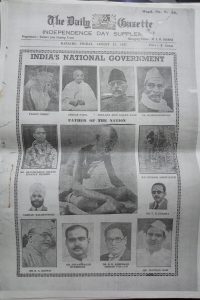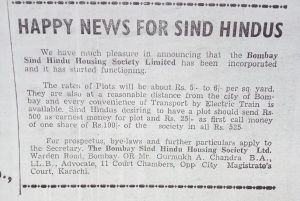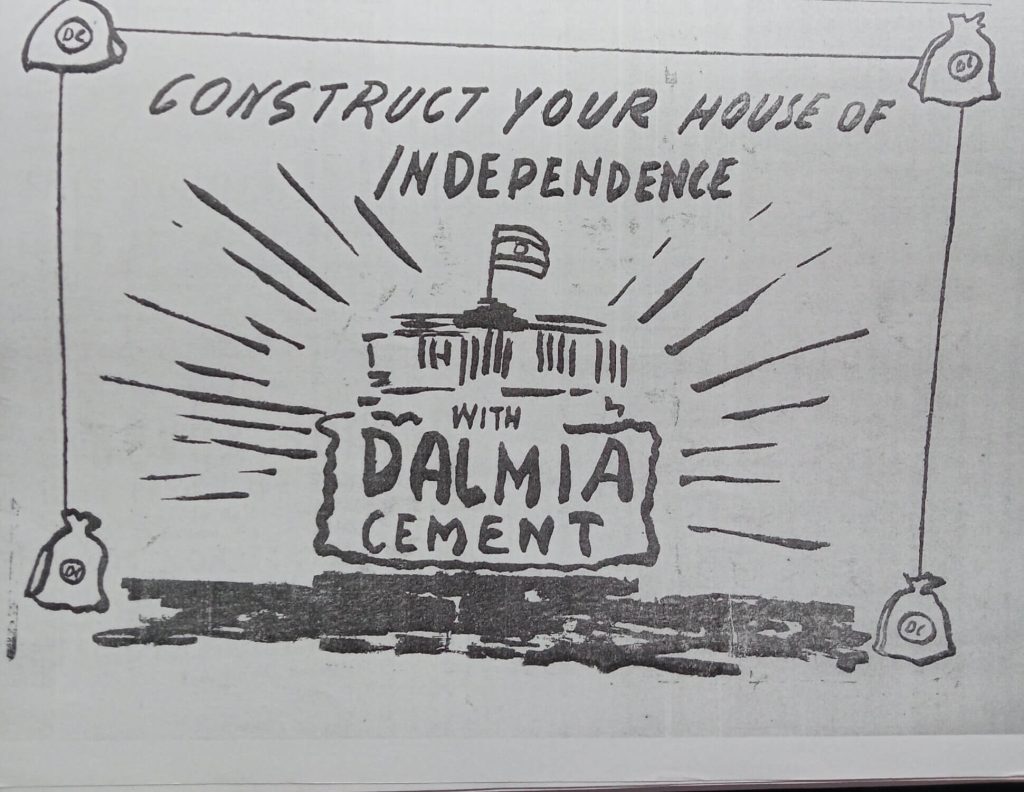The copywriter who wrote the aforementioned ad for the Friday August 15, 1947 edition of ‘The Daily Gazette’, surely knew how to catch people’s attention with his clever use of the word ‘Independence’.
The first page of this newspaper’s ‘Independence Day Supplement’ depicts India’s newly-formed National Government. It was sold for 8 annas at that time. The father of the nation is depicted at its centre. The next page honours Pakistan’s ministers, and first governor general, M. A. Jinnah.

Independence edition of The Daily Gazette, front page
How I got a copy of the 1947 edition of The Daily Gazette
This newspaper’s independence edition came to me in an uncanny way: I partook in an open-mic night in England during my master’s degree in 2016. The theme of the night was ‘ancestry’, and I chose to write about it since partition has played a big role in mine. Soon, that story became the idea behind a book. I was requested to read its first chapter at a U3 in Lancaster, UK soon after. I had no idea that a U3 instructor had seen me perform that night.
I received a copy of this newspaper as a gift from a lady who attended my reading. She was delighted to listen to my first chapter. Her father had served as an army general in India. She thought the newspapers would be a gift I’d cherish. I was speechless. I had received a beautiful present in return for telling my story.
Messages from leaders on the eve of Indian independence
I realised that most pages of The Daily Gazette were filled with messages of hope and expectations, from spiritual masters and political leaders alike after flipping through it this year:
Shri Aurobindo Gosh wrote about aims and ideals: “A revolution which should achieve India’s freedom and her unity; the resurgence and liberation of Asia and her return to the great role which she had played in the progress of human civilisation.”
Smt. Kamaladevi Chattopadhyaya wrote about ‘90 years’ struggle for freedom.’
Sadhu T. L. Vaswani proposed that “August 15 should be for self-examination, rather than celebration alone.” He expressed his sadness as he saw his own province becoming part of Pakistan, and how he felt as one without a country.
What wars do to us
That message struck a chord again this morning, when I was reading the Financial Times’ weekend edition. The picture of an Afghan woman holding her two sad-looking children on the front page reminded me of what war does to us. It breaks families, ruins livelihoods and drains us of all (perceived) stability. It occurred to me that the fate of the woman in the picture was no different that that of Indian refugees during the war of 1947. She was homeless and in deep emotional pain. Almost in an instant, my eyes well up out of pity for her.
When my grandparents fled Sindh amidst the war, they had nothing to call theirs anymore. They locked the doors and gates to their homes and left, hoping they could return to it someday. They left behind their lifestyle, city, memories and belongings. Their guru’s Darbar (place of worship) – where my grandfather and grandmother had practically been raised and met each other – was left behind with much sadness too.

Plots of land advertised in the Independence Edition of The Daily Gazette
Homes for sale for Sindh Hindus
The aforementioned advertisement in the The Daily Gazette reminded me of a conversation with my father: A gentleman in Pakistan had recently reached out to him through social media. He conveyed that many of our homes can still be found locked and untouched – in the state our ancestors had left them on the day of their hasty departure. I know the region, street name and city of my grandparents’ home. But can I ever see it again? I’ve been yearning to answer that question for the past 20 years. It’s my goal to visit it at least once in my lifetime. I will share my experiences of that trip one day for sure.
What did independence feel like for Indian refugees?
Coming back to my story. My daadi (paternal grandmother) couldn’t give us much in terms of artefacts and our homeland. But she imbibed her values, her guru’s teachings, and our language and culture in us. ‘We are real Hyderabadis, so you must know your lineage,’ she’d often say. (Thanks to her, we know our great-great-great grandfathers’ name and professions with pride).
I believe that something must have broken inside her the day she left her birthplace. Her pictures in India don’t show the same spark she had while still residing in Sindh. She lost her first child to tuberculosis after settling in Chennai. Some years later, she went blind in one eye due to an illness.
She witnessed my grandfather struggle for work in a country that was trying to rebuild itself post-war. Two of her sons migrated to the west in their late teens. One of them is my father. My uncle never came back to see her after that, which broke her heart. Her faith is what kept her alive, and her stories kept Sindh and Sindhi culture alive for us. Even when it became out of reach.
The price of Indian independence: how much did we pay?
While many people think that Indians residing abroad do so because they don’t love their country enough, that’s far from true. My grandparents had left behind their homeland to give my father and his siblings possibilities that they’d otherwise have missed out on. I read about women and girls in Sindh being kidnapped, converted and wedded against their will until today. How does one survive those atrocities? How many are given justice? I’ll never be sure, but I have faith that this changes for them someday soon.
While it’s true that independence gave us freedom from the British rule, it came with war, displacement and losses. It came with goodbyes no one was prepared for. The same goes for Afghanistan’s refugees, even though their war is of a different nature.
The rollercoaster ride as a third culture kid
For a third culture kid like me, it’s been nothing less than a rollercoaster ride growing up in the Caribbean. I’m grateful for what I’ve been given as a woman of Sindhi origin, however: I have freedom of speech. I can choose and practice my religion freely. My human rights have not been violated. I can vote. I chose the man I married myself, and I have the privilege to practice whichever profession I desire. Plus, I have my language, my culture and my traditions with me as a member of the Indian diaspora.
Many people in life have told me that freedom comes at a price. I truly believe that, and I also have an addition to that statement: The price of freedom is often so big, that it feels consuming. But that doesn’t mean it’s not worth it. Freedom is an investment that oncoming generations can reap the benefits of. I am both a witness to and proof of this.
Flags and pride: What I miss
So, normally on this day, you’d find me at the Indian Embassy for the flag-hoisting ceremony. I’d be singing the Indian national anthem with my father, and upon returning home, my mother (born to Sindhis in Suriname) would tease me saying: ‘Had your heart’s fill, my Indian daughter?’ She knows that my love for my fatherland won’t ever cease. I’d lovingly tease her back by saying: ‘It’s your fault, you had to go and give birth to me in Chennai’.
This August 15, 2021, I’m in Barcelona, my home after marriage. I celebrate our Independence with contemplation amidst the world’s complexity. I am grateful for my freedom and what our house of independence was constructed of. I am grateful for all that we as a nation have achieved in terms of economic, scientific, scholarly, cultural, and democratic progress. (Here are some top quotes from PM Modi’s address to the nation for this year.)
My wish for independence
My wish for this 75th Independence Day is that we become independent of those thoughts and beliefs that no longer serve us. That we are free from that which holds our current and upcoming generations back from growth, expansion of the mind and expansion of consciousness. And to carry on the legacy of the unknown copywriter who graced this independence edition with their cement ad:
May we always construct, rebuild and renovate our house of independence with positive energy, equality, equity and inclusion. May we use our diversity as an example and keep thriving as a nation.
Jai Hind


